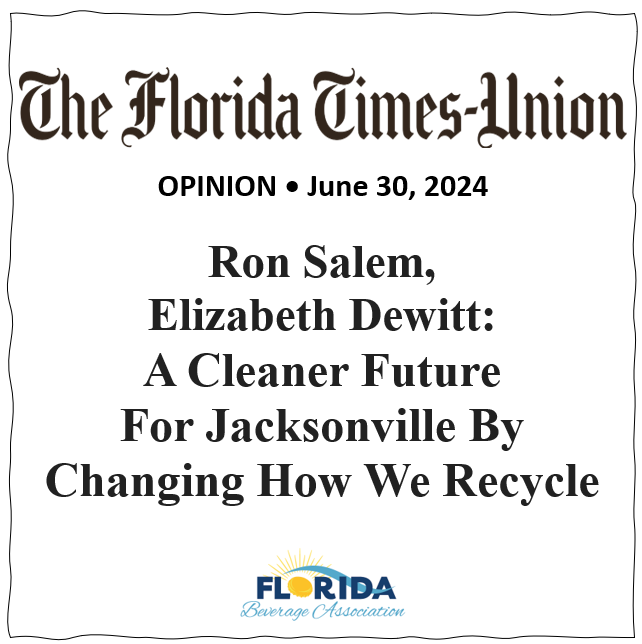A Cleaner Future For Jacksonville By Changing How We Recycle
 Last year Jacksonville was struggling to return to regular recycling habits. Curbside recycling services had been shut down for months during the COVID-19 pandemic in response to staff shortages. The disruption caused a staggering 85% decrease in recycling.
Last year Jacksonville was struggling to return to regular recycling habits. Curbside recycling services had been shut down for months during the COVID-19 pandemic in response to staff shortages. The disruption caused a staggering 85% decrease in recycling.
THE FLORIDA TIMES-UNION – When recycling got back to normal in 2022, another issue arose that needed to be tackled — contamination. Non-recyclable materials and garbage were increasingly winding up in recycling bins, fouling recyclable containers. Instead of being turned into new products, plastic bottles and aluminum cans that were made to be remade were being landfilled due to contamination.
Contamination grew from its pre-pandemic rate of 19% to 27%. Something had to be done and it would require the collective effort of government, business and environmental groups to do it.
The beverage industry has been working with communities and recycling groups across the country to modernize recycling systems and support consumer efforts to adopt good recycling habits. In Jacksonville the Florida Beverage Association collaborated with the city to fund a consumer outreach program through The Recycling Partnership.
This program would advise residents about how to eliminate contamination and increase the clean materials in their bins.
That’s when the “Feet on the Street” campaign launched in Jacksonville. Backed by a $560,000 grant from the beverage industry and matched by city funds, the campaign provided residents with personalized real-time curbside recycling education and feedback to help them recycle better. It worked.
More than 230,000 Jacksonville households received important information on how best to recycle and avoid contaminating clean materials. Its staffers followed up with visits to neighborhoods where they checked bins and provided feedback on how residents were doing. By the end of the yearlong campaign, contamination had dropped 21.7%.
This was driven by 12% of participants changing behavior after receiving direct recycling education. The Jacksonville project is now The Recycling Partnership’s largest “Feet on the Street” campaign ever.
The reduction in the contamination rate meant more materials were recovered and remade rather than ending up in a landfill or in the environment. An estimated 96 million new pounds of recyclable materials will be collected over the next decade, including more than 3.7 million pounds of polyethylene terephthalate plastic containers and more than 1.2 million pounds of aluminum cans.
The funds for the “Feet on the Street” campaign in Florida and similar programs nationwide were part of the beverage industry’s Every Bottle Back initiative. This was a sustained effort by beverage companies and environmental groups to improve recycling rates for drink bottles and cans so they can be remade as intended.
Recycling can be made better. Public-private collaborations like Jacksonville’s demonstrate that we can improve the effectiveness of our residential recycling programs through modernization, education and by working together. If it can happen here, it can happen everywhere.
Tags: Blog


